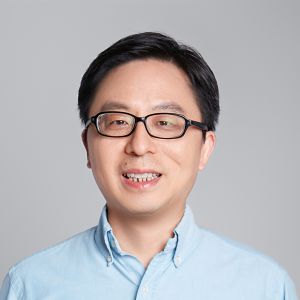
Phone:0755-88018226
Email:chenyz#sustech.edu.cn
Office:College of Science P3109
Yuanzhen Chen is currently an associate professor at SUSTech. He obtained a bachelor degree of electrical engineering from the University of Electronic Science and Technology of China, a master degree of physics from the Institute of Semiconductors, Chinese Academy of Sciences, and a PhD degree of physics from the University of Maryland, College Park in 2005. He did postdoctoral research in the University of Pennsylvania and Rutgers, the State University of New Jersey. In 2015, he joined the Physics Department of SUSTech. He was recognized as an “Overseas High-Caliber Personnel” by the Shenzhen Government (the “Peacock Plan”). His current research interest is experimental investigation of quantum computation and quantum simulation based on superconducting quantum circuits, with particular focus on robust quantum control, noise and decoherence in quantum systems, quantum simulation of many-body systems, and geometric quantum computation, etc. He has authored more than 40 peer-reviewed scientific papers.
The research interest of our team is experimental investigation of superconducting quantum computation and quantum simulation.
As the means and precision of manipulating quantum systems have advanced, the idea of quantum information, namely, processing information based on the basic principles of quantum mechanics, has also become more plausible. Quantum information processing uses quantum resources that have no classical counterparts, such as quantum superposition and entanglement, to process information, and has been shown, both theoretically and experimentally, to have tremendous advantage over classical information processing in certain scenarios. For example, quantum algorithms for integer factorization and searching unsorted database are much more efficient then known classical algorithms. Furthermore, classical simulation of a quantum system is believed to be practically intractable, while quantum simulation, using one quantum system to simulate another one, may be a straightforward and natural solution.
Among the various proposed schemes of realizing quantum computation and quantum simulation, the one based on superconducting quantum circuits appears to be promising, due to the fact that such circuits are relatively easy to fabricate, control, and scale up. Using quantum circuits based on superconducting Josephson junctions, we can build the basic block for quantum information processing, namely, the qubits (quantum bits), as well as controllable coupling between qubits. It is believed by many researchers that quantum computation based on superconducting circuits may first reach the so called Quantum Supremacy, a clear demonstration of the ability of quantum computing devices to solve problems that classical computers practically cannot.
Our team devotes to experimentally advancing the field of superconducting quantum computation and quantum simulation. The current research focus includes:
1. Superconducting quantum chips. We use Josephson-junction-based superconducting quantum devices to build qubits and various qubit-coupling schemes, as well as measurement apparatus approaching quantum limits. Besides widely adapted design, we are also interested in developing novel architectures such as hybrid quantum systems that couple superconducting circuits and other quantum devices.
2. Quantum computation and quantum simulation based on superconducting circuits. We closely collaborate with theorists to explore the possibility of realizing quantum computation and quantum simulation on superconducting quantum chips. Our current interest includes, but limited to, geometric quantum computation, quantum automata, quantum few-body systems, and quantum simulation of exemplary models in condensed matter physics. In addition, we always have a keen interest in using superconducting quantum systems to explore fundamental issues of quantum mechanics.
1998/9 - 2005/5: University of Maryland, Ph.D.
1995/9 - 1998/6: Chinese Academy of Sciences, Institute of Semiconductors, M.S.
1991/9 - 1995/6: University of Electronic Science and Technology of China, B.S.
2021/7 - present: Southern University of Science and Technology, Associate Professor
2015/3 - 2021/7: Southern University of Science and Technology, Assistant Professor
2009/1 - 2015/2: Rutgers, the State University of New Jersey, Research Associate
2006/7 - 2008/7: University of Pennsylvania, Postdoctoral Fellow
2005/6 - 2006/6: University of South Carolina, Postdoctoral Fellow
1.Robust Quantum Gates against Correlated Noise in Integrated Quantum Chips,
Kangyuan Yi, Yong-Ju Hai, Kai Luo, Ji Chu, Libo Zhang, Yuxuan Zhou, Yao Song, Song Liu, Tongxing Yan*, Xiu-Hao Deng*, Yuanzhen Chen*, and Dapeng Yu,
Phys. Rev. Lett. 132. 250604 (2024).
2.Experimental realization of two qutrits gate with tunable coupling in superconducting circuits,
Kai Luo, Wenhui Huang, Ziyu Tao, Libo Zhang, Yuxuan Zhou, Ji Chu, Wuxin Liu, Biying Wang, Jiangyu Cui, Song Liu, Fei Yan, Man-Hong Yung*, Yuanzhen Chen*, Tongxing Yan*, and Dapeng Yu, Phys. Rev. Lett. 130, 030603 (2023).
3.Experimental realization of phase-controlled dynamics with hybrid digital-analog approach,
Ziyu Tao, Libo Zhang, Xiaole Li, Jingjing Niu, Kai Luo, Kuangyuan Yi, Yuxuan Zhou, Hao Jia, Song Liu*, Tongxing Yan*, Yuanzhen Chen*, Dapeng Yu,
npj Quantum Information 7:73 (2021).
4.Simulation of higher-order topological phases and related topological phase transitions in a superconducting qubit,
Jingjing Niu, Tongxing Yan, Yuxuan Zhou, Ziyu Tao, Xiaole Li, Weiyang Liu,
Libo Zhang, Hao Jia, Song Liu*, Zhongbo Yan*, Yuanzhen Chen*, and Dapeng Yu,
Science Bulletin 66, 1168 (2021).
5.Experimental realization of non-adiabatic shortcut to non-Abelian geometric gates,
Tongxing Yan, Bao-Jie Liu, Kai Xu, Chao Song, Song Liu, Zhensheng Zhang, Hui Deng, Zhiguang Yan, Hao Rong, Keqiang Huang, Man-Hong Yung*, Yuanzhen Chen*, and Dapeng Yu, Phys. Rev. Lett. 122, 080501 (2019).